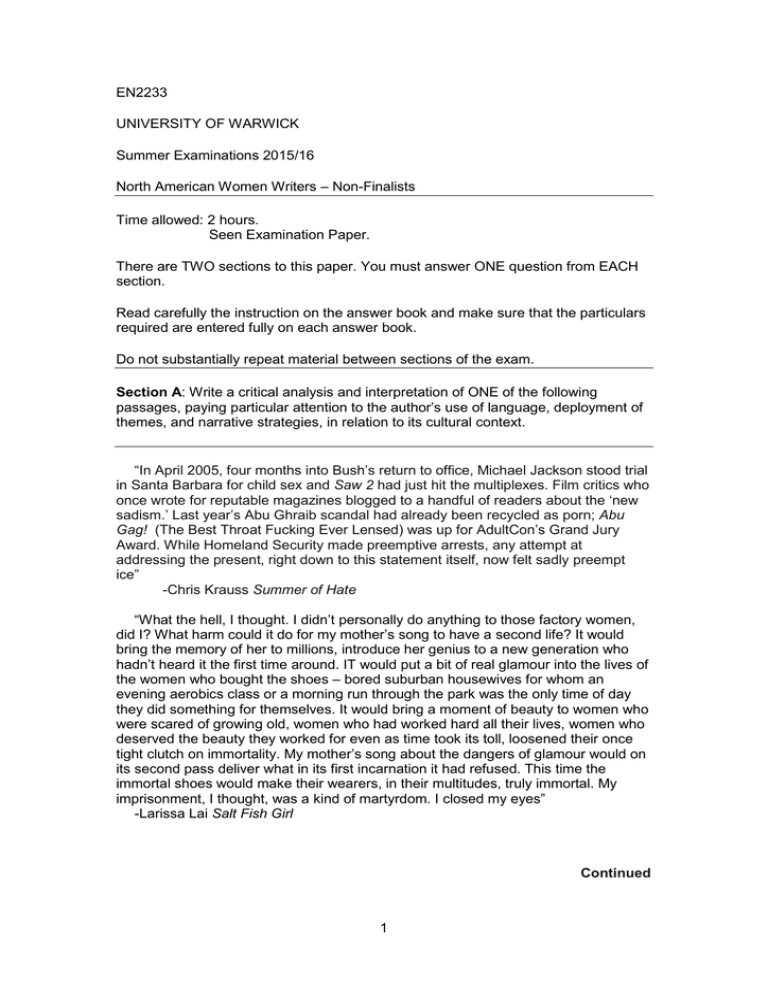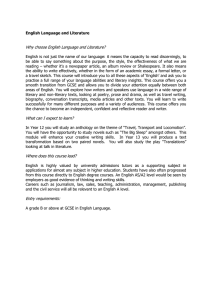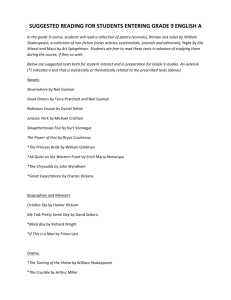EN2233 UNIVERSITY OF WARWICK Summer Examinations 2015/16 – Non-Finalists
advertisement

EN2233 UNIVERSITY OF WARWICK Summer Examinations 2015/16 North American Women Writers – Non-Finalists Time allowed: 2 hours. Seen Examination Paper. There are TWO sections to this paper. You must answer ONE question from EACH section. Read carefully the instruction on the answer book and make sure that the particulars required are entered fully on each answer book. Do not substantially repeat material between sections of the exam. Section A: Write a critical analysis and interpretation of ONE of the following passages, paying particular attention to the author’s use of language, deployment of themes, and narrative strategies, in relation to its cultural context. “In April 2005, four months into Bush’s return to office, Michael Jackson stood trial in Santa Barbara for child sex and Saw 2 had just hit the multiplexes. Film critics who once wrote for reputable magazines blogged to a handful of readers about the ‘new sadism.’ Last year’s Abu Ghraib scandal had already been recycled as porn; Abu Gag! (The Best Throat Fucking Ever Lensed) was up for AdultCon’s Grand Jury Award. While Homeland Security made preemptive arrests, any attempt at addressing the present, right down to this statement itself, now felt sadly preempt ice” -Chris Krauss Summer of Hate “What the hell, I thought. I didn’t personally do anything to those factory women, did I? What harm could it do for my mother’s song to have a second life? It would bring the memory of her to millions, introduce her genius to a new generation who hadn’t heard it the first time around. IT would put a bit of real glamour into the lives of the women who bought the shoes – bored suburban housewives for whom an evening aerobics class or a morning run through the park was the only time of day they did something for themselves. It would bring a moment of beauty to women who were scared of growing old, women who had worked hard all their lives, women who deserved the beauty they worked for even as time took its toll, loosened their once tight clutch on immortality. My mother’s song about the dangers of glamour would on its second pass deliver what in its first incarnation it had refused. This time the immortal shoes would make their wearers, in their multitudes, truly immortal. My imprisonment, I thought, was a kind of martyrdom. I closed my eyes” -Larissa Lai Salt Fish Girl Continued 1 EN2233 “Lincoln: It’s pretty dark. To keep thus illusion of thus whole thing. (Rest) But on thuh wall opposite where I sit theres a little electrical box, like a fuse box. Silver metal. Its got uh dent in it like somebody hit it with they fist. Big old dent so everything reflected in it gets reflected upside down. Like yr looking in uh spoon. And that’s where I can see em. The assassins. (Rest) Not behind me yet but I can hear him coming. Coming in with his gun in hand, thuh gun he already picked out up front when he paid his fare. Coming on in. But not behind me yet. His dress shoes making too much noise on the carpet, the carpets too thin, Boss should get a new one but hes cheap. Not behind me yet. Not behind me yet. Cheap lightbulb just above my head. (Rest) And there he is. Standing behind me. Standing in position. Standing upside down. Theres some feet shapes on the floor so he knows just where he oughta stand. So he wont miss. Thuh gun is always cold. Winter or summer thuh gun is always cold. And when the gun touches me he can feel that Im warm and he knows Im alive. And if Im alive then he can shoot me dead. And for a minute, with him hanging back there behind me, its real. Me looking at him upside down and him looking at me looking like Lincoln. Then he shoots. (Rest) I slump down and close my eyes. And he goes out thuh other way. More come in. Uh whole day full. Bunches of kids, little good for nothings, in they school uniforms. Businessmen smelling like two for one martinis. Tourists in they theme park t-shirts trying to catch it on film. Housewives with they mouths closed tight, shooting more than once. (Rest) They all get so into it. I do my best for them. And now they talking bout cutting me, replacing me with uh wax dummy” -Suzan-Lori Parks Topdog/Underdog “I want a house on a hill like the ones with the gardens where Pap works. We go on Sundays, Pap’s day off. I used to go. I don’t anymore. You don’t like to go out with us, Papa says. Getting too old? Getting too stuck-up, says Ninny […] I stop listening. People who live on hills sleep so close to the starts they forget those of us who live too much on earth. They don’t look down at all except to be content to live on hills. They have nothing to with last week’s garbage or fear of rats. Night comes. Nothing wakes them but the wind . One day I’ll own my own house, but I won’t forget who I am or where I came from. Passing bums will ask, Can I come in? I’ll offer them the attic, ask them to stay, because I know how it is to be without a house. Some days after dinner, guests and I will set in front of a fire. Floor boards will squeak upstairs. The attic grumble. Rats” they’ll ask. Bums, I’ll say, and I’ll be happy.” -Sandra Cisneros The House on Mango Street Continued 2 EN2233 SECTION B: Answer ONE of the following questions. Your answer should be based on a discussion of TWO or THREE texts on the module. Do not attempt to cover more than three texts at length. 1. Compare and contrast how two or three novels from this module represent the possibility and limits of cross-cultural or racial modes of female solidarity. 2. Many of the novels we have read this year engage in forms of revision – either rewriting historical events or older cultural forms. Taking two or three texts from the course, analyze the ways in which and the meaning behind the texts’ renegotiation of older histories, genres, and texts. 3. Turning to two or three texts we’ve looked at this year, develop an argument comparing the role that borders play. These can be national, state, local, or even psychological. 4. Many of the texts we’ve looked at this year challenge heteronormative sexuality. Choose two or three examples from the course and analyse how these novels carry out this challenge and to what effect. 5. Examine how two or three texts studied on this novel make use of real historical events or facts. What is the relationship between fact and fiction in these novels and what role does this insertion of “real life” into fictive spaces play? End 3







